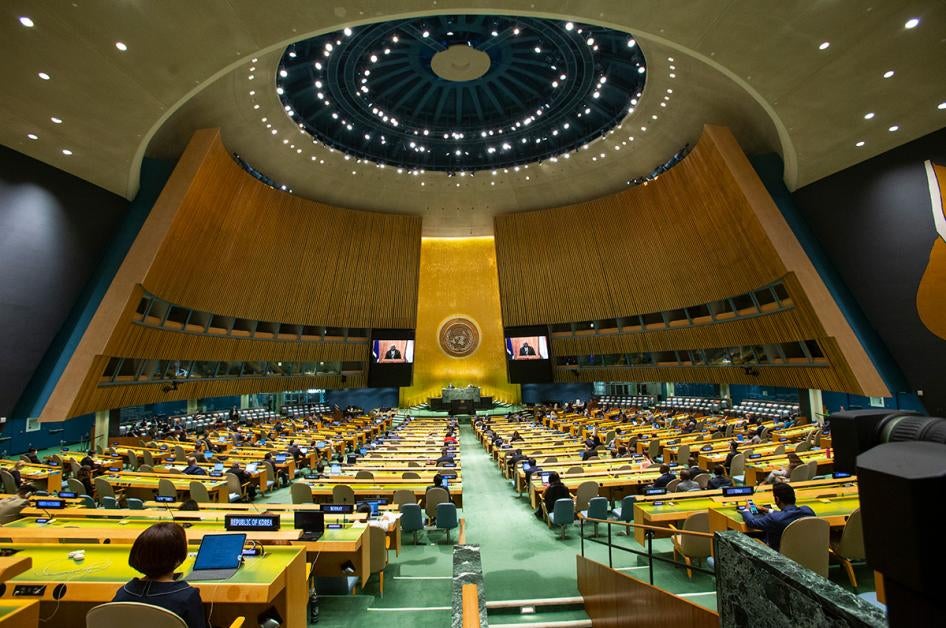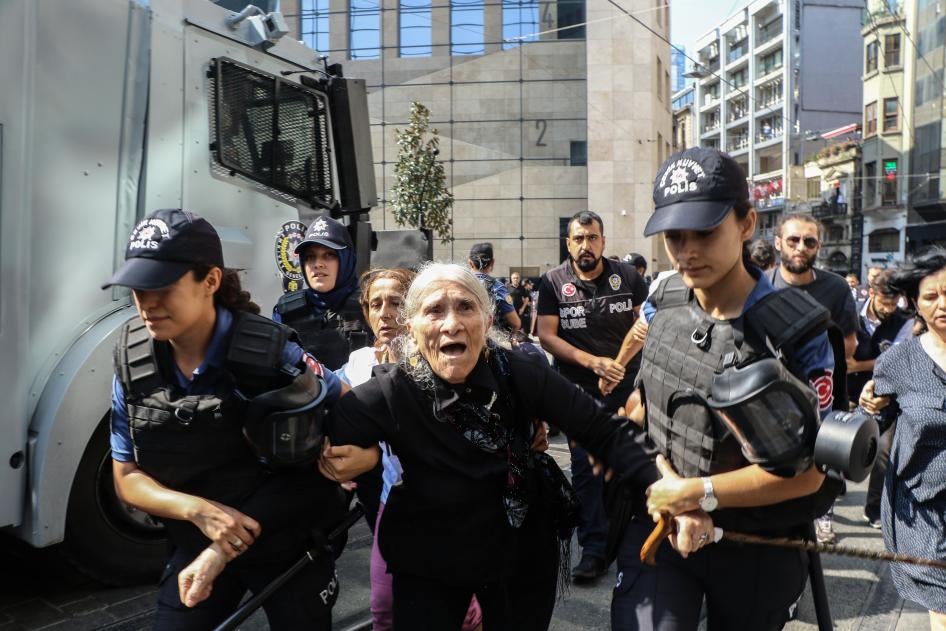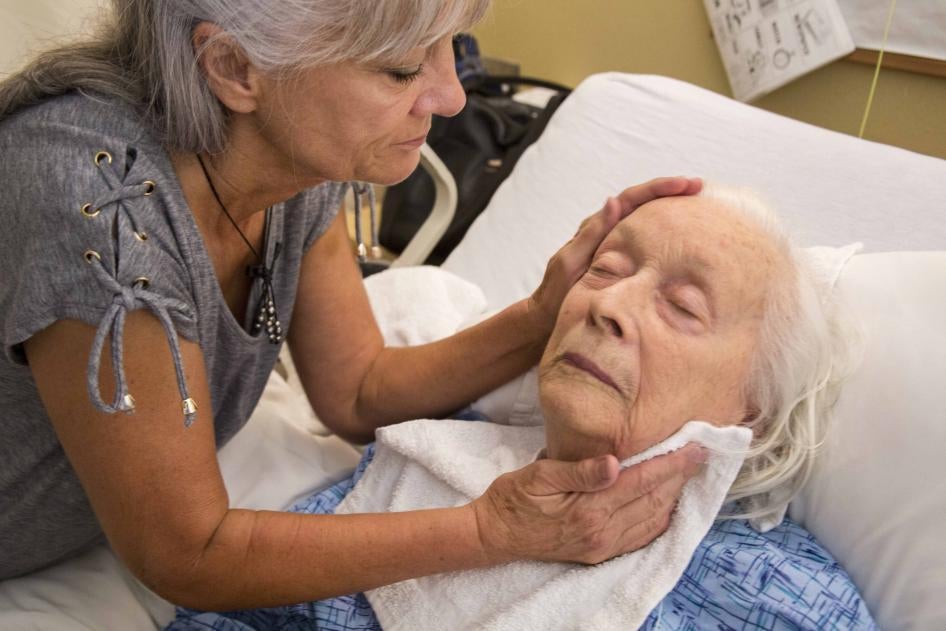A Checklist for the UN’s Annual Meetup: Daily Brief
- World Leaders at UN General Assembly;
- Trial of Turkey’s Saturday Mothers;
- Older Persons in Chemical Prisons;
- Take Note;
- Trains Over Planes: Readers Respond;
- Quote of the Day: World Cup Sponsors.
By Andrew Stroehlein. Contact me at DailyBriefTeam@hrw.org and Twitter @astroehlein.
A Checklist for the UN’s Annual Meetup
It’s that time of year again, when the great and the good – and, let’s face it, some of the not so great and not so good – gather in New York for the UN General Assembly’s annual General Debate.
The week of speeches by world leaders in the General Assembly Hall will be the first since 2019 that will be almost entirely in person. (Ukraine’s president will be an exception and speak via video.)
Here’s a quick, admittedly incomplete, wish list of what we’d like to see heads of state and government focus on this year, at minimum:
- the UN report detailing crimes against humanity in the Xinjiang region of China;
- Russian atrocities in Ukraine;
- war crimes and crimes against humanity in Ethiopia;
- war crimes and crimes against humanity in Myanmar;
- war crimes and crimes against humanity in Syria;
- the blanket oppression of women and girls in Afghanistan;
- plans of action for feeding the world’s hungry; and
- tackling the devastating impacts of climate change.
Will global leaders speaking at the gathering actually address all these issues? Who knows? But at least you now have a checklist to measure their performance this week.
By the way, we’ll be following along from the sidelines with you. Unfortunately, the UN secretariat has an unnecessary and counterproductive practice of barring nongovernmental organizations from UN headquarters during this week, the busiest in the UN calendar.
Trial of Turkey’s Saturday Mothers
It was the 700th time they met, remembering their missing relatives and asking for justice. But the authorities were having none of it.
Riot police were called in to disperse them, violently enforcing a ban on those holding their peaceful vigil in the central İstanbul location where they always met. Authorities subsequently put 46 on trial.
Four years later, the next hearing of that trial charging them with refusal to disperse takes place tomorrow, September 21.
Turkey’s “Saturday Mothers” are the family members of individuals who were forcibly disappeared – that is, those last seen in the custody of state agents – in Turkey in the 1980s and 1990s. Taking the Mothers of the Plaza de Mayo in Buenos Aires as their model, they have been gathering, with some interruptions due to security fears, in İstanbul since 1995.
In asking uncomfortable but essential questions, the Saturday Mothers/People (as they are more formally known since their ranks have swelled over the years) have apparently been a thorn in the side of the authorities, who have unleashed numerous crackdowns against them.
Most recently, on August 30, police prevented them making a public statement on the International Day of the Disappeared and detained 14 of them.
Against all the odds, their vigil continues, and the core questions remain: why are they prohibited from gathering peacefully, and what do the authorities fear from their search for the truth about Turkey’s disappeared people?
(special thanks to reader Dr. Eren Alkan for reminding me about this case for inclusion in the Daily Brief today)
Older Persons in Chemical Prisons
A new report by the UN independent expert on the rights of older persons hits hard: “[i]n some countries, older people are more likely to be de facto deprived of liberty in care facilities than in prisons.”
One area it highlights is the use of chemical restraints – medication to control behavior without a therapeutic purpose – which, the report says, is “widespread and abusive.”
In the US, for example, during an average week in 2018, more than 179,000 older people in nursing homes were given antipsychotic drugs without an appropriate diagnosis.
There are also serious concerns about chemical restraints in the UK and Canada, as well as Australia, despite new regulations.
Of course, the problem in some places starts with a lack of home- and community-based support services, which often forces older people into institutions against their will. But even in cases where people choose freely to live in a facility, that doesn’t mean they are giving up their rights.
And it certainly doesn’t mean they should be condemned to chemical prisons.
Take Note
(curated today by Lisa Maier)
- #PayUpFIFA: World Cup sponsors should back remedies for workers (HRW)
- US: Dozens of migrants flown in “political stunt” from Texas to Massachusetts island, known as a vacation getaway for Democrats (The New Yorker)
- Head of Iran’s morality police suspended amid protests following Mahsa Amini’s death (The Guardian)
- Ban Ki-moon calls for world leaders to prioritize global stability over national agendas: 'Bold action is needed to restore trust in multilateralism' (Le Monde, English)
Trains Over Planes: Readers Respond
Yesterday, I recounted my long train-and-ferry journey across half of Europe to avoid travelling by air due to emissions concerns. Readers got in touch to voice their opinions, particularly on Twitter...
Laurent Cultiaux said: “For leisure it is easy: trains all the way. If connections are a bit iffy, stay and visit, take the next one. Went from Belgium to Portugal, Sicily, Romania in 2 days that way (over 3 years). For work, it depends much more on your employer.”
Joost said, “I don't have to travel for work but as emigrant I visit my family back home twice a year - in summer and for Christmas. Would love to do it by train, but I looked it up last summer and it's multiple times the flight price. I just can't afford it. :-(”
Laura Larmo from Finland highlighted the hassle of buying multiple tickets for different surface transport providers over long distances and asked why “there aren't any one-stop websites from which you could buy all the tickets” at once.
Indeed, I had to buy the various tickets for my trip from four different providers. Maybe European transport operators could do something like the airlines do with codesharing?
I don’t know how difficult that would be, but surely, the easier it is to travel over land and sea, the more likely it is that people will avoid air travel.
Please email me or contact me on Twitter with your ideas.
Quote of the Day: World Cup Sponsors
“Brands buy rights to sponsor the World Cup because they want to be associated with joy, fair competition, and spectacular human achievement on the playing field—not rampant wage theft and the deaths of workers who made the World Cup possible.”
Minky Worden, HRW’s director of global initiatives calling on FIFA World Cup sponsors to back remedies for workers.
___________________________________________________
Help promote human rights – forward this email to others & encourage them to sign up here.


